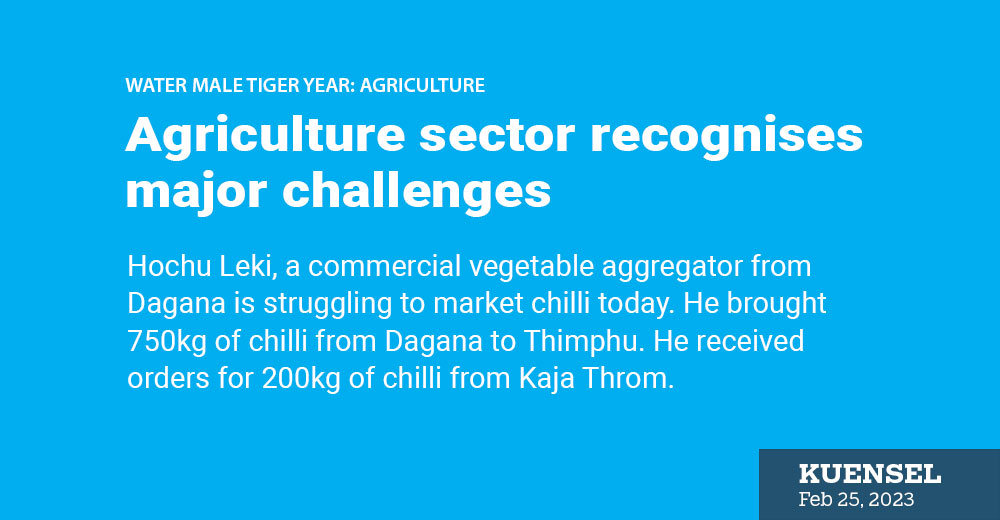Chhimi Dema
Water Male Tiger Year: Agriculture – Hochu Leki, a commercial vegetable aggregator from Dagana is struggling to market chilli today. He brought 750kg of chilli from Dagana to Thimphu. He received orders for 200kg of chilli from Kaja Throm.
“The rest I’ll have to find a market,” he said, adding that it takes about a week to sell the chilli.
Farmers expect their produce to sell in the market but low prices and the presence of cheap imported produce don’t allow them to earn well, Hochu said.
Lack of market has affected most Bhutanese farmers in the Male Water Tiger year as the agriculture sector also continued to face threats from climate change and wildlife.
The livelihood of country’s 60 percent population is dependent on agriculture, the most climate-sensitive sector. But the sector is greatly impacted by changing climate.
In the year, farmers lost paddy to flash floods and windstorms, and crops to pests such as armyworms.
World Bank report stated that nearly 690 million people, 8.9 percent of the global population, are hungry. The report also stated that the food security challenge is intensified by agriculture’s extreme vulnerability to climate change. Extreme weather events around the world are predicted to occur frequently due to climate change.
The human-wildlife conflict was a major threat impeding the growth of the sector. Farmers lost cattle and crops to elephants, leopards, wild dogs, wild boars, deer, monkeys, and porcupines.
The electric fencing technology introduced to ward off wild animals proved ineffective in many cases. The government in the past three years (from 2020 to 2022) distributed more than Nu 259 million worth of electric and other fences benefiting 30,526 farming households.
Agriculture Minister Yeshey Penjor during the Parliament reported that the ministry allotted Nu 500 million in 2022 to construct chain-linked fencing as a measure to address human-wildlife conflict (HWC).
Villagers in Tsirang’s Kilkhorthang gewog got together to clear the thickets and bushes on abandoned private fallow land to reduce instances of HWC. And in Sarpang, farmers reported that even after two decades, the HWC continues and they have to wake up at night, light up big fires, and shout to scare away the elephants.
Marketing challenges
With increased investment and interventions, farmers saw surplus vegetable production. However, marketing the produce remained a challenge. Farmers complained of cheap imported chilli flooding the market.
Lack of coordination and information during the lockdown in the early months of the year caused aggregators to suffer loss. The aggregators could not receive travel permits to take the produce to other dzongkhags for sale.
Understanding marketing challenges and emerging issues caused by climate change, the Ministry of Agriculture and Livestock developed a strategy, Vegetable Research and Development Strategy 2023 to 2027, to address the current challenges.
The Male Tiger year showed that the agriculture sector needs to work to become resilient and adapt to climate change. As evident from various extreme weather events, pests and diseases in parts of the country, the sector needs to strive for more climate-smart initiatives.
The regular instances of HWC caused more harm to farmers to grieve. The sector could study why wildlife turns to settlements and farms and find a sound approach to address the issue.
Livestock
Much development took place in the livestock sector last year. It saw the launch of Yak semen artificial insemination, a sturgeon farm and mastiff farm, and an effort to conserve the changkhyi breed.
The livestock department signed a memorandum of understanding with an international brand to produce wool. This is expected to strengthen the livelihood of the highlanders.
A Nu 150 million highland development programme focusing on yak product diversification (dairy and wool), and genetic improvement of yaks, sheep, horses, and mastiff dogs started.
The country experienced a shortage of eggs in the year. The temporary shortage was caused by feed contamination which affected 485,245 layer birds causing the daily egg production to drop from 382,490 eggs to 120,723 eggs.
There were two incidences of the African swine fever outbreak costing it more than Nu 21.2 million to control them.
The livestock department led the Nationwide Accelerated Dog Population Management and Rabies Control Programme (NADPM and RCP) to control the free-roaming dog population.
Through the programme, dog shelters were constructed in Thimphu and Paro.


